Gases
In biology, gases play a crucial role in various biological processes. Gases are composed of molecules that move freely and rapidly in all directions. Understanding the behavior and properties of gases is important in comprehending various biological processes, such as respiration and photosynthesis.
Gas Laws
Several laws govern the behavior of gases, including Boyle's Law, Charles's Law, and the Ideal Gas Law. These laws describe the relationships between the pressure, volume, temperature, and quantity of a gas, and are essential in understanding the behavior of gases in biological systems.
Gas Exchange in Living Organisms
Gas exchange is the process by which oxygen is taken up and carbon dioxide is released by living organisms. In humans, for example, this process occurs in the lungs during respiration. The respiratory system facilitates the exchange of gases between the external environment and the body's internal environment, allowing for the uptake of oxygen and the removal of carbon dioxide.
Photosynthesis and Gaseous Exchange
In plants, gases play a vital role in the process of photosynthesis. During photosynthesis, plants take in carbon dioxide from the atmosphere and release oxygen as a byproduct. This exchange of gases is essential for the production of glucose and other organic compounds that sustain the plant and provide energy for other organisms in the ecosystem.
Study Guide
- Learn and understand the gas laws, including Boyle's Law, Charles's Law, and the Ideal Gas Law.
- Explore how gases are exchanged in the respiratory system of humans and other animals.
- Study the process of photosynthesis and how plants exchange gases with the environment.
- Practice solving problems related to gas laws and gas behavior.
- Explore real-life examples and applications of gas behavior in biological systems.
By mastering the concepts of gases and their behavior, you will gain a deeper understanding of biological processes and their relevance to the living world.
[Gases] Related Worksheets and Study Guides:
.◂Biology Worksheets and Study Guides High School. DNA technology/genetic engineering
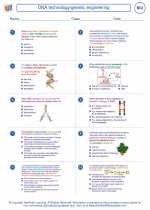
 Worksheet/Answer key
Worksheet/Answer key
 Worksheet/Answer key
Worksheet/Answer key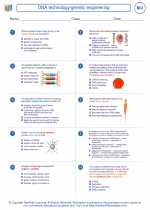
 Worksheet/Answer key
Worksheet/Answer key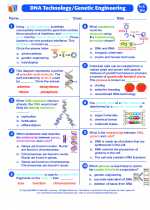
 Vocabulary/Answer key
Vocabulary/Answer key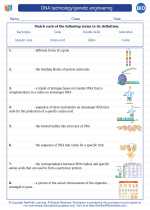
 Vocabulary/Answer key
Vocabulary/Answer key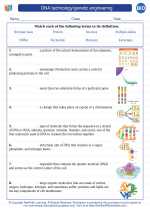
 Vocabulary/Answer key
Vocabulary/Answer key
